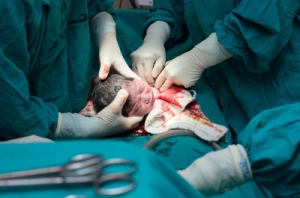
An article on an Australia news site has made me think about how why shame is so often associated with giving birth.
The author, Kim Lock, argues that “shame” is a word that “crops up frequently when we talk about childbirth.” She says that anyone who criticises high rates of intervention in childbirth, or the prevalence of caesarean sections, is liable to be accused of shaming women.
She says that this is a way of closing down debate, and that challenging high intervention rates is the right thing to do – and that women should be able to cope with listening to these criticisms without feeling upset about it.
For example, she argues:
“No medical procedure comes without short or long term risk yet these risks are infrequently explained. Over one-third of Australian births now take place via caesarean section, a procedure that carries increased risk of infection, admission to ICU, haemorrhage or death.”
In one sense, Lock is absolutely right. It’s important to be able to raise concerns about the overuse of medical intervention in childbirth and to highlight the risks involved. It’s equally important – though she doesn’t say this – to acknowledge there can be risks in not intervening, and that for some women, a caesarean option can be a safer option (in terms of both physical and mental health) than a vaginal delivery.
But what really struck me about Lock’s article is this: how on earth did we get to the situation where women feel ashamed of something as personal as how they give birth? In the vast majority of cases, when a woman has a caesarean or other medical intervention, it’s not her choice. It’s a decision that has been made by medical staff that – in almost every case – the woman has little option but to comply with. Who is going to say, when told that her baby will die if she doesn’t agree to a caesarean, “I’d rather not”?
And the shaming goes the other way too. Women who want a home birth or even a natural birth are often the recipients (online, at least) of enormous amounts of hostility about how they are “selfish”, risking the life of their baby and so on. Some people seem to feel almost gleeful when a “natural” birth goes wrong – the view seems to be that any woman stupid enough to think she could give birth without medical help deserves to suffer.
When it comes to giving birth, women are often faced with contradictory pressures: from a natural childbirth movement that says that women should trust the ability of their own bodies to give birth without intervention; and from a medical profession that sees giving birth as a dangerous and risky process that requires medical support.
What are women supposed to do in the face of these competing pressures? It’s fine to say, as Lock does, that women should be able to make “informed” choices, but how, in reality, is a woman going to make sense of the different information offered to her?
Lock cites as an example of poor care a woman “who wished for a vaginal birth but was told her baby was ‘too big’.” It would have been good if the woman had been supported by her caregivers to try for a vaginal birth. But I can’t help thinking of a woman I interviewed for my book who, realising that she was going to have a very large baby, pleaded with her doctors both before and during labour for a caesarean. She was refused one (this was in Spain, which may be relevant), and ended up having a 37-hour labour, four hours of which were spent pushing. She gave birth to an 11lb baby boy.
The effort of pushing the baby out led to her damaging a nerve in her neck, which gave her intense headaches for a month afterwards that meant she had to wear glasses all the time. She also had painful episiotomy stitches and said: “I was a complete physical wreck. I couldn’t walk, I couldn’t breastfeed, I couldn’t take my glasses off.”
For her, a planned caesarean would have been a much happier outcome (and indeed it was, when she gave birth to her second child).
The moral is this: birth is an unpredictable business. Medical professionals should explain the risks and benefits of having a procedure – or not having it – and women should be able to make an informed choice. Their preferences should at the very least be acknowledged. But the important thing is that women should never be made to feel ashamed of the way they gave birth.